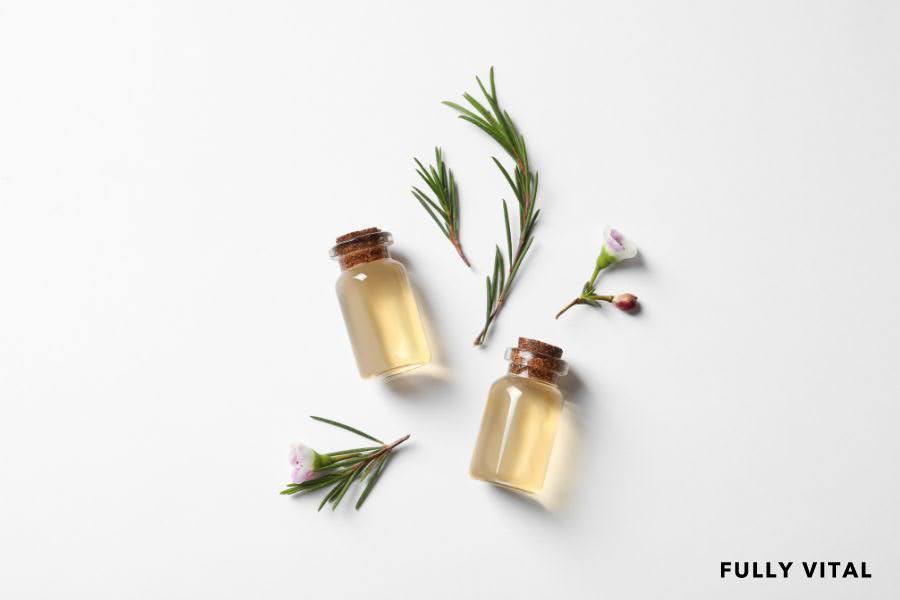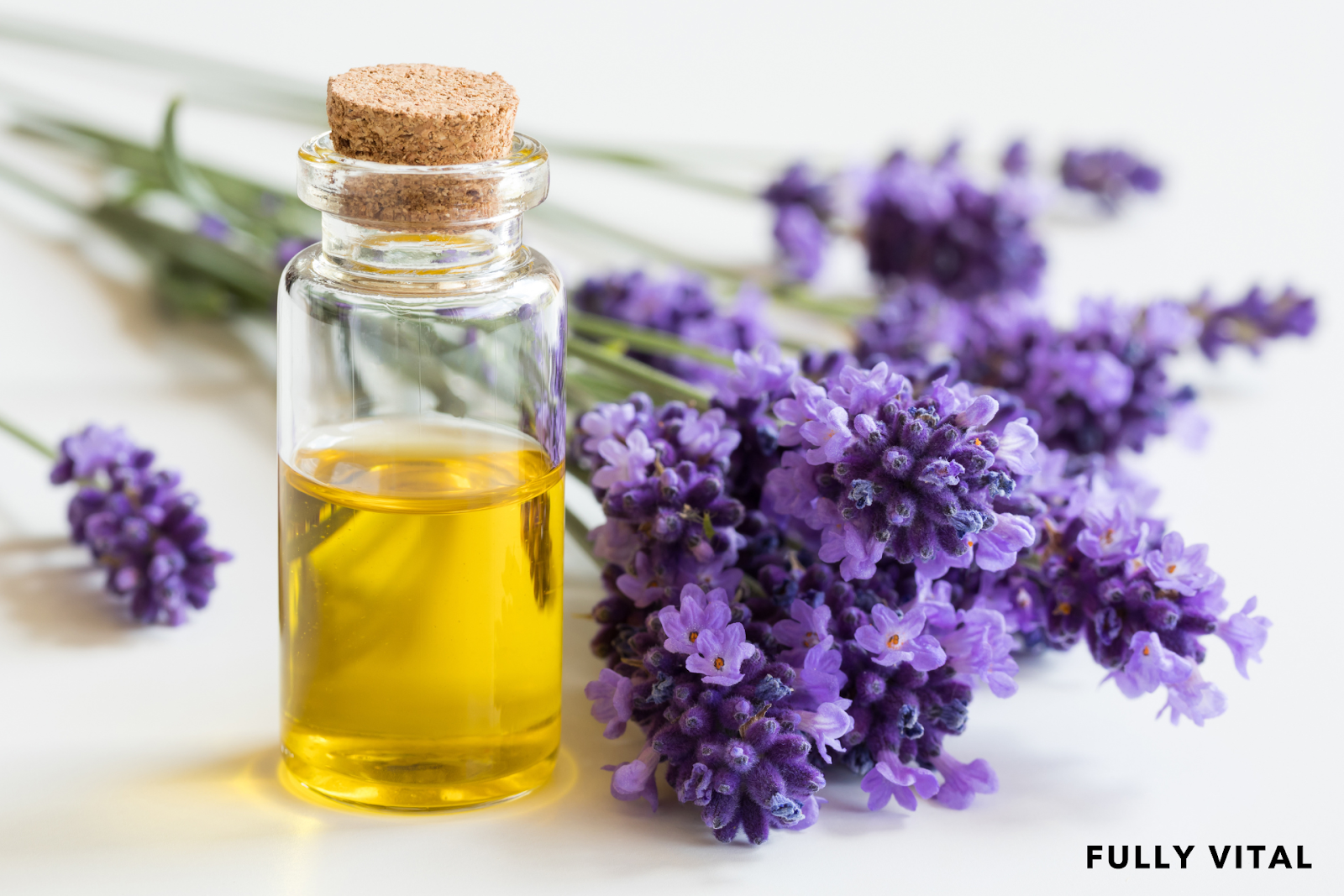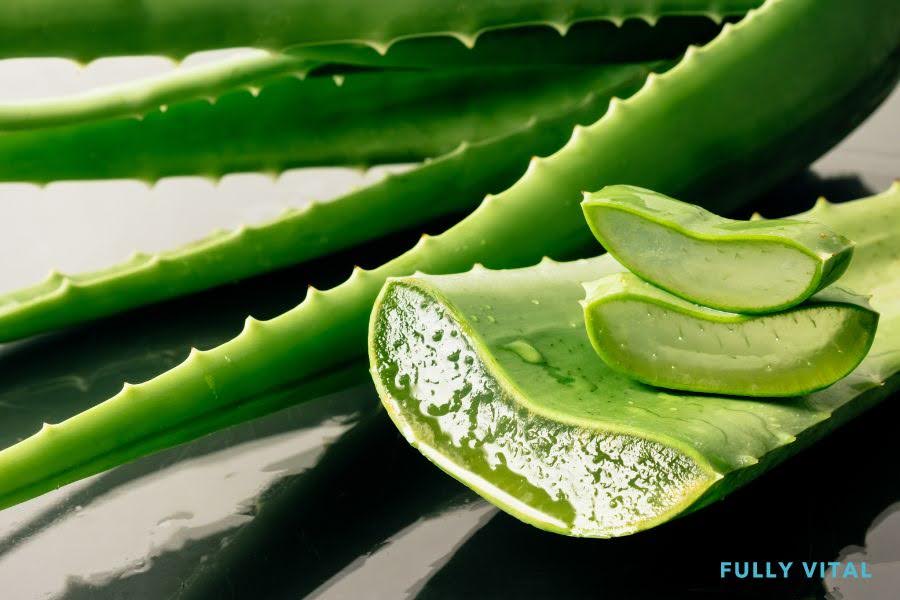
Tea Tree Oil: The Scalp Cleaner For Healthy Hair
Maintaining a healthy scalp is essential for strong, healthy hair, yet it often doesn't receive the attention it deserves in hair care routines.
Tea tree oil is an effective natural remedy for cleaning the scalp and tackling issues that can compromise hair health.
Its antibacterial and antifungal qualities offer a straightforward approach to addressing problems like dandruff and dryness.
Addressing scalp health is just the beginning.
For those seeking a more profound solution to hair thinning, Fully Vital's Enhance Hair Growth Serum offers an innovative approach.
Don't let hair thinning hold you back, Explore the potential of Fully Vital and take the first step towards fuller, healthier hair today.

I LOVE MY HAIR NOW
FullyVital hair serum and hair vitamins made tremendous improvements in my hair. I truly love my hair now.
Shop Hair ProductsWhat Is Tea Tree Oil?
Tea tree oil, also known as melaleuca oil, is an essential oil derived from the leaves of the Melaleuca alternifolia, a small tree native to Australia.
It's been used for centuries by indigenous communities for its natural healing properties.
The oil is extracted using a steam distillation process, which preserves its potent active ingredients, such as terpinen-4-ol.
Due to its antibacterial, antifungal, and anti-inflammatory properties, tea tree oil has become popular in skincare and hair care products.
It's often used as a natural remedy for various scalp conditions, thanks to its ability to cleanse and soothe.
How Does Tea Tree Oil Benefit The Scalp?
Antiseptic Properties
Tea tree oil's strong antiseptic properties make it effective against common scalp issues like dandruff.
It works by breaking down the buildup of dead skin cells and reducing the presence of bacteria and fungi that can lead to itching and flakiness.
A clean scalp paves the way for the hair follicles to strengthen and produce hair, thus improving overall hair health.
Regular use of tea tree oil can keep such annoyances at bay, maintaining the scalp's natural balance.
Its ability to clear up blockages in the pores also helps to ensure nutrients can reach the hair roots more effectively.
Moisturizing Effects
While it is known for its cleansing abilities, tea tree oil also exhibits impressive moisturizing properties.
It can help regulate oil production on the scalp, preventing excess grease while keeping it sufficiently hydrated.
This balancing act is crucial for individuals with either dry or oily scalps, as it promotes a more even environment for hair growth.
Unlike harsh chemical alternatives that strip the scalp of its natural oils, tea tree oil nurtures the necessary moisture without causing irritation or dryness.
Hair Growth Stimulation
The presence of tea tree oil on the scalp can also contribute to better hair growth conditions.
By improving blood circulation and freeing the hair follicles from debris, tea tree oil creates an environment conducive to hair growth.
Studies have suggested that it may even help in stimulating dormant hair follicles, enhancing hair thickness and growth speed.
Its use encourages a healthier scalp, a fundamental component for achieving strong and healthy hair strands.

How To Apply Tea Tree Oil To Your Scalp?
Dilution Is Key
Due to its potency, tea tree oil should never be applied directly to the skin.
It's imperative to dilute it with a carrier oil, such as coconut or olive oil, to prevent irritation.
A general guideline is to mix a few drops of tea tree oil with one tablespoon of carrier oil.
This mixture ensures that the benefits of tea tree oil are enjoyed without risking a negative reaction, preserving the skin's natural barrier and maintaining scalp health.
Incorporation Into Your Routine
Integrating tea tree oil into your scalp care routine can be quite simple.
It can be included in your regular shampooing by adding a couple of drops to your shampoo or conditioner.
Alternatively, creating a scalp massage oil by blending it with a carrier can be an effective way to harness its benefits.
Massaging this mixture into the scalp for a few minutes before rinsing can help in maximum absorption and effectiveness.
Precautions And Patch Test
Before implementing tea tree oil into your hair care practice, conducting a patch test to check for allergic reactions is essential.
Apply a small amount of the diluted oil onto a patch of skin, like the inner arm, and wait for 24 hours to see if any reaction occurs.
If irritation, redness, or swelling develops, it’s best to refrain from using the product on the scalp.
Always prioritize safety when using powerful natural remedies such as tea tree oil.
What Are The Best Practices For Tea Tree Oil Storage And Shelf Life?
Proper Storage Conditions
Maintaining the efficacy of tea tree oil means storing it correctly.
The oil should be kept in a dark, glass container to protect it from light exposure, which can degrade its quality.
Storing it in a cool, dry place away from direct sunlight ensures the preservation of its active compounds.
These conditions help prevent the oil from becoming rancid and losing its therapeutic properties over time.
Monitoring Shelf Life
Tea tree oil, like all essential oils, has a finite shelf life, typically ranging from 1 to 2 years when stored properly.
Keeping track of the purchase date and noting any changes in smell, color, or consistency can help in determining if the oil is still effective.
Expired tea tree oil should not be used, as it can cause skin irritation and won't provide the desired scalp benefits.
Usage And Handling
Minimizing the oil's exposure to air and contaminants is crucial.
Always close the lid tightly after use and use a dropper to dispense the oil to prevent contamination.
Avoid using the oil if it has come into contact with water or any other substance that could introduce bacteria.
These practices help keep the tea tree oil in its best state, ensuring its benefits are delivered with each application.
What Should You Look For When Buying Tea Tree Oil?
Purity And Composition
The quality of tea tree oil is paramount for it to be effective.
Look for 100% pure, therapeutic-grade tea tree oil without any additives or fillers.
The purity can affect the strength and efficacy of the oil, so checking labels and sourcing from reputable suppliers is essential.
Additionally, products that disclose their composition and concentration levels provide transparency and assurance of quality.

Certification And Brand Reputation
Certifications can be an indicator of quality and ethical sourcing.
Organizations such as the Australian Tea Tree Industry Association (ATTIA) certify tea tree oil based on strict standards.
Researching the brand's reputation and reading reviews can help determine if they're delivering a high-standard product.
Brands that are transparent about their sourcing and manufacturing processes tend to be more reliable.
Packaging And Sustainability
Protective packaging, such as amber or cobalt blue glass bottles, helps to maintain the integrity of tea tree oil by shielding it from light and oxygen.
Additionally, choosing a brand that prioritizes sustainability in its harvesting and production methods aligns with responsible consumerism.
Look for brands that invest in rejuvenating the ecosystem from which they source their tea tree oil to minimize environmental impact.
Improve Your Scalp Health With Tea Tree Oil
Ready to make a change? Explore hair growth products with Fully Vital. Discover more about our approach to a healthier scalp today! |
Final Thoughts On Tea Tree Oil
Tea tree oil holds a valued place in natural scalp treatments with its multifaceted benefits and versatile applications.
When used correctly, it can offer significant improvements in scalp health, which in turn supports robust hair growth.
In the pursuit of a clean and balanced scalp, tea tree oil stands out for its ability to treat without the harshness of artificial chemicals.
In the pursuit of a clean and balanced scalp, tea tree oil stands out for its ability to treat without the harshness of artificial chemicals.
To further enhance your hair care regimen, explore the range of Fully Vital's hair growth products.
Our Enhance Hair Serum, specifically formulated with essential nutrients and natural ingredients, promotes thicker, fuller hair, seamlessly integrating with your routine for optimal scalp health and hair vitality.
Read Also:
- Cold Cap Therapy: Stimulating Hair Growth
- Hair Transplantation: Get Back Your Gorgeous Locks
- Hair Mineral Analysis: What You Need To Know
Frequently Asked Questions About Tea Tree Oil
Can tea tree oil help with itchy scalp conditions?
Yes, tea tree oil has anti-inflammatory properties that can help soothe itchy scalp conditions.
When used as part of a regular hair care routine, it can alleviate discomfort associated with itchiness.
Will tea tree oil make my hair oily?
When used properly in small amounts and diluted with carrier oil, tea tree oil balances scalp oil production without leaving your hair greasy.
How often should I use tea tree oil on my scalp?
It's recommended to use tea tree oil-infused products or treatments once or twice a week.
Frequent use beyond this can lead to drying out your scalp.
Can I leave tea tree oil on my scalp overnight?
For sensitive skin, it's not recommended to leave tea tree oil on the scalp overnight.
For others, it can be beneficial if well-diluted and used occasionally.
Is tea tree oil safe for color-treated hair?
Yes, when properly diluted, tea tree oil is generally safe for color-treated hair.
However, it's always advisable to perform a patch test first or consult your hairstylist.
Does tea tree oil work on all hair types?
Tea tree oil can be beneficial for various hair types, especially when targeting scalp health, but it’s important to adjust the concentration to individual needs and hair types.
Can tea tree oil help reduce hair thinning?
While tea tree oil doesn't directly affect hair thickening, it can create a healthy scalp environment conducive to hair growth, which may indirectly help with hair thinning.
Is there anyone who should avoid using tea tree oil?
People with sensitive skin, pregnant or nursing women, and young children should consult with a healthcare provider before using tea tree oil.
How do I know if I'm allergic to tea tree oil?
Perform a patch test by applying a diluted amount of tea tree oil to the skin and wait 24 hours to check for signs of redness, irritation, or swelling.
Does tea tree oil have an expiration date?
Yes, tea tree oil typically has a shelf life of 1 to 2 years.
It should be stored properly and checked for changes in smell, color, or consistency.
Sources:
- Gupta, A., & Chander, S. (2015). Anti-inflammatory and immunomodulatory activities of terpenoids from Melaleuca alternifolia (tea tree). Phytochemistry, 95, 161-172. https://link.springer.com/chapter/10.1007/978-981-16-8117-2_11
- Carson, C. F., Hammer, K. A., & Riley, T. V. (2006). Melaleuca alternifolia (tea tree) oil: A potential anti-dandruff agent. Journal of the American Academy of Dermatology, 54(5), 879-885. https://www.ncbi.nlm.nih.gov/pmc/articles/PMC1360273/
- Cavanagh, H. B., & Wilkinson, J. D. (2006). Tea tree oil: A potent anti-inflammatory agent. Complementary Therapies in Medicine, 14(2), 107-114. https://www.mdpi.com/1999-4923/15/10/2489








